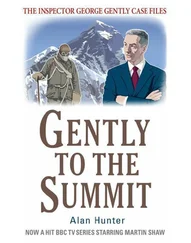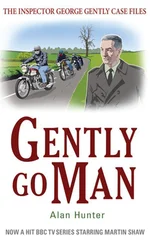Alan Hunter - Gently where the roads go
Здесь есть возможность читать онлайн «Alan Hunter - Gently where the roads go» весь текст электронной книги совершенно бесплатно (целиком полную версию без сокращений). В некоторых случаях можно слушать аудио, скачать через торрент в формате fb2 и присутствует краткое содержание. Жанр: Классический детектив, на английском языке. Описание произведения, (предисловие) а так же отзывы посетителей доступны на портале библиотеки ЛибКат.
- Название:Gently where the roads go
- Автор:
- Жанр:
- Год:неизвестен
- ISBN:нет данных
- Рейтинг книги:4 / 5. Голосов: 1
-
Избранное:Добавить в избранное
- Отзывы:
-
Ваша оценка:
- 80
- 1
- 2
- 3
- 4
- 5
Gently where the roads go: краткое содержание, описание и аннотация
Предлагаем к чтению аннотацию, описание, краткое содержание или предисловие (зависит от того, что написал сам автор книги «Gently where the roads go»). Если вы не нашли необходимую информацию о книге — напишите в комментариях, мы постараемся отыскать её.
Gently where the roads go — читать онлайн бесплатно полную книгу (весь текст) целиком
Ниже представлен текст книги, разбитый по страницам. Система сохранения места последней прочитанной страницы, позволяет с удобством читать онлайн бесплатно книгу «Gently where the roads go», без необходимости каждый раз заново искать на чём Вы остановились. Поставьте закладку, и сможете в любой момент перейти на страницу, на которой закончили чтение.
Интервал:
Закладка:
‘How often did he go there?’
‘Pretty often, sir. Twice a week, I shouldn’t wonder.’
‘Do you know who he used to meet there?’
‘No sir, I was never there with him.’
‘Have you been there yourself?’
‘A couple of times, sir. Just for a cup of char, that’s all.’
‘Who did you see there?’
‘Well… mostly drivers…’
‘Anyone you knew?’
‘No sir. Nobody at all.’
Gently nodded very slowly, struck a match for his pipe. Timmins strained his arms once or twice, ventured a look towards Gently. Withers sat sideways away from them, nursing his knees and sucking. Campling kept staring at the desk where the wisp of wool lay on the paper. The stores, the sites around them were silent. The office was hot and full of smoke.
Gently said: ‘I’m not going to ask you how much you know about what was going on here. I’ll put it this way. Could you give me a guess who was in this business with Sawney?’
‘None of us wasn’t in it, sir,’ Timmins mumbled. ‘We never had no part in it.’
‘You had eyes,’ Gently said. ‘I’m not asking you to incriminate yourself.’
‘No sir,’ Timmins said. He pulled on his arms another time. ‘It was someone outside, sir,’ he said. ‘You’re right if that’s what you’re thinking.’
‘Who?’
‘Don’t know, sir.’
‘Have you seen him?’
‘Not proper I haven’t,’ Timmins said. ‘But he’s got a truck, I know that. It wasn’t one of our jobs.’
‘Tell me about it,’ Gently said.
‘It was once when I was on guard,’ Timmins said. He stopped. He looked halfway towards Withers.
‘Oh, carry on,’ Withers said. ‘I shan’t be listening to this bit, Timmins.’
‘Yessir,’ Timmins said. ‘When I was on guard, sir. We use the dispersal hut by number three hangar. There wasn’t no night flying or anything, everybody had packed up. So I thought I might as well drop round to the mess — there’s a Wraf I know who works there, sir. So I borrowed one of the erks’ bikes-’
‘What time would that be?’ Gently asked.
‘Be about one,’ Timmins said. ‘I hung on in case the duty officer showed up.’
‘Wasn’t me,’ Withers said to his pipe.
‘No sir,’ Timmins said. ‘I don’t remember who it was, sir.’
‘I should keep it like that,’ Withers said, ‘were I you.’
‘Yessir,’ Timmins said. ‘I don’t remember. But when I got down here there was a light in the store — not all of them on, just one, I reckon — and there was a truck standing out in the yard, and a couple of blokes were loading stuff into it.’
‘And you were on guard?’ Campling inquired sourly.
‘I did go and look, sir,’ Timmins said. ‘I wasn’t to know it wasn’t something proper, we have had calls for stuff during the night.’
‘So what else did you see?’ Gently said.
‘I saw that one of the men was the WO, sir. And I reckoned it must have been on the up-and-up, though it did strike me as a bit queer at the time.’
‘What about the other man?’
‘I didn’t recognize him, sir. There was only the light coming through the door. But he was a big bloke, like the WO, and he’d got on one of those khaki jackets.’
‘Did you see the truck clearly?’
‘It was one of those big jobs, painted a dark colour. Not one of ours.’
‘Did you notice the make?’
‘I reckon it might have been a Leyland, sir. I didn’t pay a lot of attention to that.’
‘A Leyland,’ Gently said. ‘Could the dark colour have been green?’
‘Yessir, could have been,’ Timmins said.
‘Thank you,’ Gently said. ‘That’ll be all for now, Corporal.’
Timmins dragged his feet together, threw up an uncertain salute.
‘Hook it,’ Campling said tersely. ‘I might forget you’ve been given immunity.’
Timmins slunk to the door, but there halted, partly turning again.
‘What’s worrying you, Timmins?’ Withers asked.
‘I was wondering,’ Timmins mumbled, ‘if we could go to tea, sir?’
Withers chuckled. ‘Go on. Clear off. But don’t show your nose out of camp.’
‘No sir,’ Timmins said. ‘Thank you, sir.’ He went through the door, closing it meticulously.
Campling lit a fresh cigarette, blew fierce smoke at the ceiling. ‘Can we tie Sawney in any tighter?’ he asked. ‘Or won’t a simple hanging do for you?’
Gently gave a little shrug. ‘It’s pretty tight,’ he admitted.
‘Teodowicz’s truck was a Leyland, painted green?’
‘Yes,’ Gently said. ‘But there are two Leylands. Two Leylands, two big men, and possibly two khaki jackets.’ He struck another light for his pipe. ‘Will Jonesie have gone to tea?’ he asked Withers.
‘Not till I get back,’ Withers said.
‘Get him on the phone,’ Gently said.
Withers rose from his toolbox, went over to the desk, phoned the Orderly Room.
‘What do you want to know?’ he asked.
‘More about past personnel,’ Gently said. ‘I seem to remember airmen with Norwegian flags on their shoulders. I’d like you to ask Jonesie if he remembers any being here.’
‘Roger,’ Withers said. He put the question to the phone. ‘Yes,’ he said, after a pause. ‘Oddly enough, there were some here.’
‘Does he remember any names?’
Withers asked. ‘No, no names. Apparently there were only one or two, and they were soon remustered somewhere else.’
‘Can you get me their names?’ Gently asked Campling.
‘I’ll try,’ Campling said. ‘Is it important?’
Gently also blew smoke at the ceiling. ‘It’s an angle,’ he said. ‘It had better be covered.’
CHAPTER SIX
Thursday, in the evening. The August twilight beginning. The sun melted away indefinitely into a haze of red, orange and umber. The bleached sky becoming dusty. A single large and very yellow star. The air thick and sodden with heat and with the humidity that would be a dew. Beetles flying. A bat disporting itself like a butterfly, in a quiet corner. A flush of young starlings going to roost. A partridge scolding from the stubble. Aircraft, black, swathed, huge, standing silent around the deserted perimeter, breathing, to a little distance, oil and glycol and a certain sourness. Number three hangar, closed, but with a draped Magister standing outside it. A Nissen hut with bikes stood about it, a couple of starting trolleys, some gantries, covers. An airman in shirtsleeves appearing at the door, watching incuriously, vanishing again.
And on the Road the vehicles had sidelights for the light which was neither one thing nor the other, bating no speed although the drivers were squinting and reacting less surely to their problems in velocity. Two had died in the past ten minutes, having failed in some calculation of differential. Other mathematics allowed for further mortality at a predictable rate per minute. Some of these condemned had read of Teodowicz. They had been deaf to more distant bells. And they would die with little stir, though perhaps more fearfully and no less bloodily. But nobody would hang because of that. Their deaths were too numerous and commonplace. A vehicle is a clumsy blunt instrument which can scarcely be wielded more than once. A small fine, a brief imprisonment, that would be society’s limit. Death itself is unimportant. Only the weapon has significance.
And the stars began to define themselves above the statistics of the Road, dusting the greyish dim hemisphere with a thousand million of computations, clarifying the terrestrial egotism with an index of mild infinity, but unseen: infinitesimally, North and South went its way.
Gently came to The Raven.
It was a one-storey timber building and was shaped like an L, with the gable-end of the short stroke nearest to the road. It stood alone. It was two miles from Everham, a mile and a half from Huxford village. Behind the building lay a garden with some fruit trees, but beyond that the fields, and the fields were dark. The interior of the L formed a vehicle park. At the front of the park were three derelict petrol pumps. Near the pumps stood a post carrying a rusted sign. The sign represented an heraldic raven and bore the name beneath in Gothic letters. At the foot of the post was a painted board which read: Transport Cafe; Meals; Bed and Breakfast. The windows of the short stroke were dimly lighted. The windows of the long stroke were not. A door, set in the short stroke near the angle, had a naked bulb over it and a sign: Open. In the park were two trucks, an articulated, a removal van, a black Mini-Minor and a moped. From the building came the distorted sound of a jukebox playing.
Читать дальшеИнтервал:
Закладка:
Похожие книги на «Gently where the roads go»
Представляем Вашему вниманию похожие книги на «Gently where the roads go» списком для выбора. Мы отобрали схожую по названию и смыслу литературу в надежде предоставить читателям больше вариантов отыскать новые, интересные, ещё непрочитанные произведения.
Обсуждение, отзывы о книге «Gently where the roads go» и просто собственные мнения читателей. Оставьте ваши комментарии, напишите, что Вы думаете о произведении, его смысле или главных героях. Укажите что конкретно понравилось, а что нет, и почему Вы так считаете.












